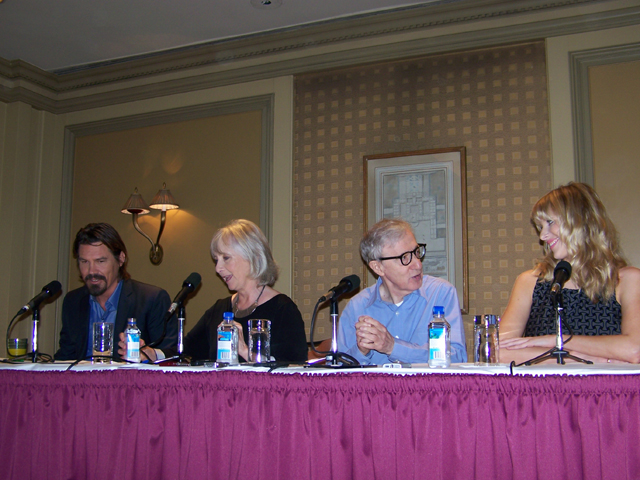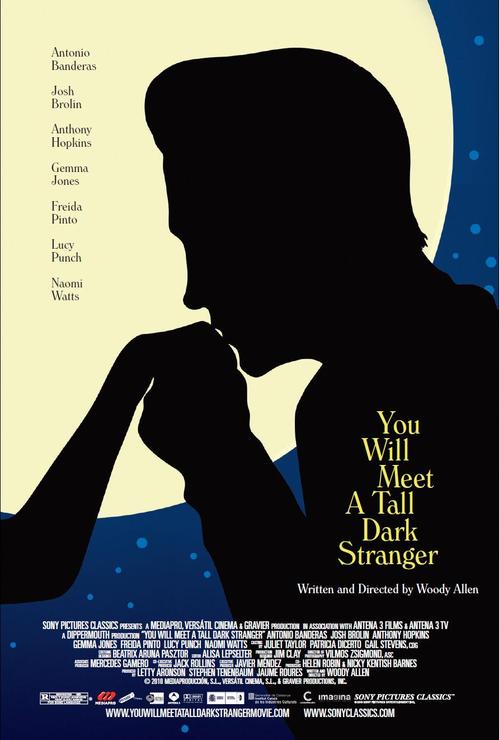Despite not being the biggest fan of his latest film You Will Meet a Tall Dark Stranger (read my review) it’s hard not to be in awe of the master filmmaker Woody Allen still churning out movies yearly at the tender age of 74. During the press conference for his film, Allen shed some light on his unique filmmaking process, why he continues to make films year after year, how locations shape a film’s outcome by sighting an example from Annie Hall and why he will never make a film like Stanley Kubrick. So check out this illuminating interview with the legendary director that reveals some insight about his neurotic personality.
Q: How does this film relate to the the spiritual turmoil in your other films, particularly Interiors?
WA: This film was an attempt to deal with the same subject but to deal with it in a more comic way then Interiors but the subject matter is still the same thing. It’s still about the inability of people to relate to one another, people needing some kind of certainty in life, people deluding themselves into some sense that life has got some purpose or that there’s some extra meaning to life when in fact it’s a meaningless experience. In the end, even faith in anything at all is better than no faith at all and these are all the same subjects as Interiors but here the characters play them with more humor.
They’re still serious but it’s played with more humor and I was reminded of years ago when I was on television with Billy Graham and I was taking this bleak outlook position and Billy Graham was saying to me that even if I was right and he was wrong and there was no meaning to life and it was a bleak experience and there was no God and no afterlife or no hope or anything, that he would still have a better life than me because he believed differently. Even if he was a hundred percent wrong, our lives would both be completed and I would’ve had a miserable life wallowing in a bleak outlook and he would have had a wonderful life confident that there was more.
So that was one of the main themes of this picture that someone like Gemma Jones could be diluted as I felt Billy Graham was diluted and that she would have a better life than someone like Josh who is more scientific minded and has a more realistic view of life but was going to have the more miserable life.
Q: What are the basic elements the turn a romantic comedy into a classic?
WA: A classic is a de facto experience, you’ll find that over the years certain comedies last and endure, they remain fun to see 10 years later, 25 years later and another romantic of these which were delightful for people at the time just are not. When I was a boy I went to see many films that were delightful romantic comedies with June Allyson and Esther Williams and they were delightful and I loved them and they were fine. But they’ve kinda gone and vanished and there others that I saw like Shop Around the Corner which year after year remains just a wonderful film to see and you look up after many years and you find that a thing has become a classic because it’s meaningful to people and alive decade after decade.
Q: How does the locations of your films change the vision you have when writing the script?
WA: It does, it’s meaningful. Because it’s a movie and your watching it and when you’re sitting in a room writing the script your alone in your bedroom and it’s nothing. Then you get out there and I’m constantly rewriting the script for locations. A good example of that is Annie Hall. I wrote the character lives in Flatbush, Brooklyn and his father is a cab driver and then I was with my art director and we were scouting in Brooklyn and we saw this apartment under the cyclone roller coaster and I thought it was great and so I quickly rewrote that he was born in an apartment underneath the roller coaster and his father was not a cab driver, he worked in Coney Island at a concession stand and the whole things was changed completely. I’ve done that a 100 times over the years because you can’t anticipate the room, or the riches that you come across when your location hunting for movies.
Q: Can you describe your rehearsal process?
WA: I myself don’t like to speak to the actors at all. I like to hire great people and let them do their thing. I don’t like to speak to them, I don’t like to have lunch with them, I don’t like to socialize with them, I don’t like to hear their ideas. Josh Brolin wanted to play his part in a wheelchair. He called up and said could he play the character like that, this is what you get when you’re the director. Of course he can’t play the part in a wheelchair. When you talk to actors, they’re thinking about acting. They decide to play it as a hunchback and they’re going to grow a beard. The less I speak to the actors the better. I always hire great people and I don’t want to impose my preconceived notions on them, they know how to play it.
Lucy Punch knew how to play it. That was a character she created. I wrote the character but what you’re seeing on the screen is her creation. She moved like that, spoke like that. I didn’t know the nuances of that when I wrote it. I just wrote the cold lines in a room. Same with Gemma, these people infuse it with what’s made them wonderful actors and actresses. So the less I have to speak to them, the better.
I didn’t know Naomi Watts at all. She was a wonderful actress for years, beautiful. I saw no reason to meet her, she had nothing to say to me. What am going to tell her? She knows how to act. She read the part, said she was going to do it so she must know what it is. She came in that morning, we said hello, the usual exchange of insincerities. You know I’m a great fan of your movies and I love all your films and yes, I love all your films and all that nonsense. And then she had her hardest scene in the picture, she just started off cold and did the scene where she confronts Gemma and wants the money for her business and Gemma’s not going to give her the money because the medium has advised her not to.
That was a very very strongly acted scene between the two women. Now Gemma I had worked with for the prior week or two but Naomi I hadn’t even met her. She came right in and did it, completely professional and great. For me that’s the best way to work, I don’t like to meet the actor and have a lot of conferences and talk about their sub-life and their off screen life and their backstories and all that nonsense because it never means anything. They never know why they’re good. They think they’re great because they’re doing all this extra work when in fact, when they wake up in the morning they’re Jack Nicholson or Robert DeNiro or Josh Brolin and it’s built in but they think it’s all this other stuff but it’s not. They’d be great if they didn’t think about their part or they did think about it. (To Josh Brolin) I hope you’re digesting this well.
Q: Why do you continue to make movies year after year?
WA: I work all the time because it’s a great distraction and it keeps me from sitting at home and obsessing morbidly. If I just got up in the morning and had no place to go and was retired or something, I would be sitting there and be thinking of the same thing that Anthony Hopkins thought off when he woke up in the middle of the night. You start thinking gee what is the purpose of life? Why is everything finite? Why do we get old and die? Is there nothing out there? Why is it so tragic, why do our loved ones perish? Why do we degenerate? Who wants to think about that stuff?
So I’m thinking about, gee, if I call Josh Brolin will he be available for this? I don’t know Lucy, will she be able to do this as well as I think she will? These are all problems that you can solve and it makes you feel that you have some control over your life and if you don’t solve them and it turns out that one of them was wrong for the part, what’s the worse that happens? You have a bad movie, but you don’t die. That’s why I keep making movies.
Q: Is there something in your long career that you still hope to accomplish?
WA: Yeah, I’d like to make a great movie. I’ve made many movies, I think I’ve made some good movies, but I never felt I’ve made a great movie. If you think about the truly great movies like Rashomon and The Bicycle Thief and 8½ and Grand Illusion, I don’t think I’ve ever made a film that could be on a program with those films. I’m not saying this out of false modesty or self-deprecation, realistically those are really enormous achievements and I’d like to make something like, that would be fun but you can’t set out to do that. You get lucky and if you work enough maybe one of them turns out to be terrific but so far that hasn’t happened.
Q: Are there any advantages or disadvantage to making a film every year? Do you ever fantasize about pulling a Stanley Kubrick and spend years obsessing over one movie?
WA: I don’t know, I’m a completely different kind of person. Kubrick was great artist and a perfectionist. He always wanted the exact right thing and did a million takes and everything had to be perfect, I’m an imperfectionist. I don’t really care that much about the work, I write quickly and shoot carelessly. If the characters are working and I have a dinner engagement I don’t do 20 takes, I do 5 takes and go home because I want to go to dinner. I don’t have the same dedication to my art that he has, so I would never do that. But there is an advantage in having a routine, in working with the same people when you can and writing as a regular thing and filming as a regular thing.That routine pays off for you, you get a lot of productivity that way rather than just sitting around waiting for inspiration and waiting for the perfect thing to happen. I would be much less productive that way.
You Will Meet a Tall Dark Stranger is currently in limited release.




